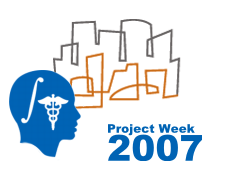Projects/Slicer3/2007 Project Week Drafting Human Interface and Slicer Style
 Return to Project Week Main Page |
 Return to Project Week Main Page |
 Return to Project Week Main Page |
Key Investigators
- BWH: Wendy Plesniak
- Kitware: Yumin Yuan
Objective
This document will be a resource for Slicer developers who want to create module interfaces that are understandable and usable, and that conform to Slicer's visual appearance and behavior conventions. The document will also provide:
- downloadable elements (icon blanks, logo blanks, usability engineering forms/checklists, useful shell scripts, etc.)
- links to KWWidgets class descriptions
- links to related Slicer development documents.
Questions:
- What should this document contain to be most useful?
- How can we include user-centered design practice into our 'best practices' approach for open source software development?
Approach, Plan
The content of these guidelines is influenced by the published recommendations of other usability efforts, including the wyoGuide, GNOME's HIG2.0, Apple's Human Interface Guidelines, and the Java Look and Feel Guidelines.
Develop:
- recommendations for using interface elements effectively and consistently across the application,
- general principles for crafting interfaces that:
- are easy to learn (for beginners especially)
- are easy to use (for beginners, intermediate and expert users alike) and
- provide a consistent user experience application-wide.
Note: these guidelines will not be strictly enforced. Developers can deviate from them when they don't fit the application.
Progress
An initial outline of this document has been started with some initial text and resources.
Goal:
To have a draft outline in place before the project week begins, to complete it during the week with feedback about what it needs to contain, and to begin writing the content.
References
- wyoGuide: a cross-platform HIG
- Apple Human Interface Guidelines
- GNOME Human Interface Guidelines
- Java Look and Feel Design Guidelines
- Java Look and Feel Design Guidelines: Advanced Topics